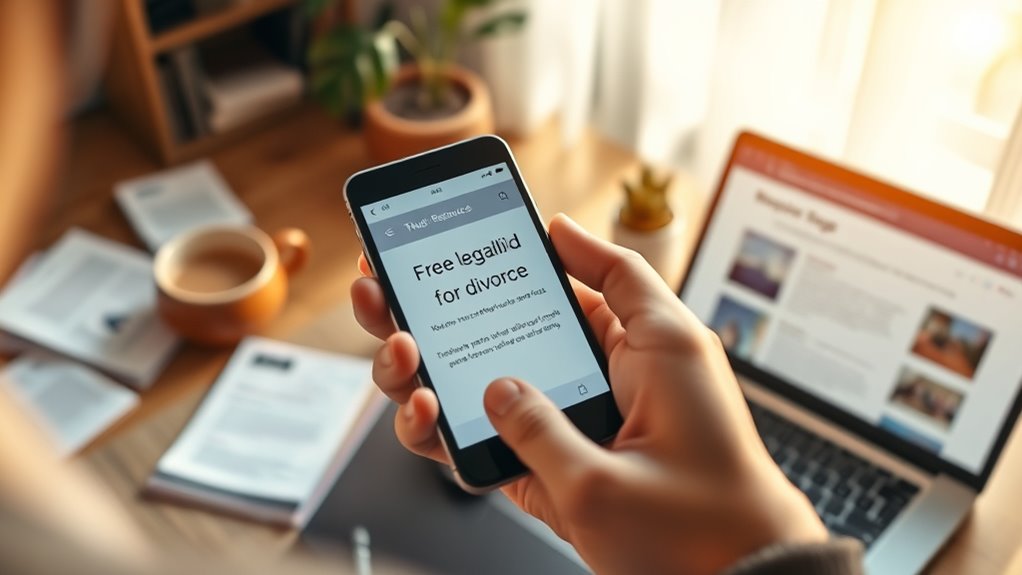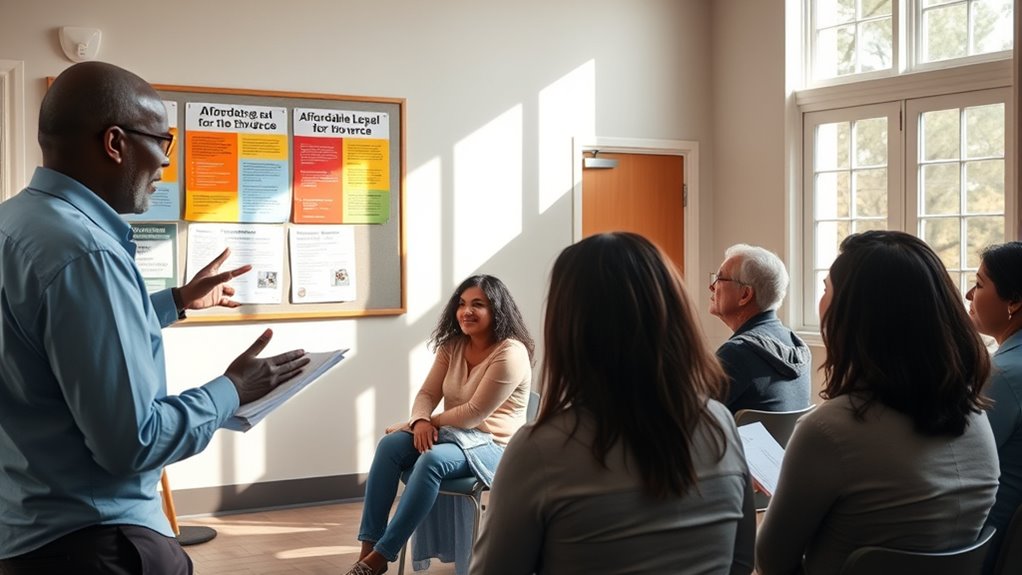If you’re seeking free or low-cost legal aid for divorce, start by exploring organizations like LawHelp.org and local legal aid offices that offer free clinics and resources tailored for low-income individuals. Many nonprofits focus on uncontested divorces, providing free guides, forms, and assistance with paperwork. Pro bono programs also connect you with volunteer attorneys. Keep looking into available services, as there are ways to navigate divorce without heavy expenses—more helpful options are ahead if you continue exploring.
Key Takeaways
- Contact local legal aid organizations funded by LSC for free or low-cost family law assistance.
- Visit nonprofit family law clinics and online resources like LawHelp.org for guidance and free legal forms.
- Seek volunteer attorneys through the North Carolina Pro Bono Resource Center for free legal help.
- Explore state-specific online forms and clinics that assist with uncontested divorce filings.
- Register for accessible clinics or use online tools to manage divorce paperwork independently if eligible.

Are you facing divorce and worried about legal costs? You’re not alone. Many people in your situation struggle to afford traditional legal representation, but there are resources designed to help you navigate the process without breaking the bank. Nationwide, the Legal Services Corporation (LSC) funds over 130 nonprofit legal aid groups that serve low-income clients. These organizations focus on family law issues like divorce, child support, and custody, offering free or low-cost assistance. You can also visit websites like LawHelp.org and Law Help Interactive, which provide access to free legal forms and step-by-step guides for uncontested divorces. These platforms make it easier for you to prepare your paperwork without hiring an attorney, saving money and reducing stress.
Many nonprofits and legal aid clinics specialize specifically in family law matters, including divorce cases. They often focus on straightforward, uncontested divorces where both parties agree on key issues. Legal Aid of North Carolina, for instance, runs simple divorce clinics that teach you how to file your divorce papers on your own. These clinics provide legal document packets and instructional videos to guide you through the process. While they don’t offer personalized legal advice, you can ask volunteers general questions about filing procedures. These clinics are free, open to everyone, and held in multiple counties—though you need to register beforehand. Accessibility accommodations are often available, ensuring you can participate regardless of your circumstances. Legal Aid of North Carolina offers these clinics across many counties, making them accessible to a broad range of individuals. Additionally, some states have specialized programs that help streamline the divorce process for low-income individuals, further reducing costs.
Legal Aid clinics offer free divorce guidance, legal documents, and workshops across counties—registering in advance ensures accessible, straightforward assistance.
Pro bono legal services also play a crucial role. The North Carolina Pro Bono Resource Center coordinates volunteer attorneys willing to offer free legal help. In recent years, these attorneys contributed thousands of hours assisting low-income clients with family law issues, including divorce. Local Pro Bono Councils help match volunteers with clients based on regional needs, making sure you can access help close to home. Many attorneys participate in recognition programs that honor their commitment to providing free legal services, further encouraging volunteerism. However, your case’s complexity and your income level may influence whether you qualify for free assistance through these programs.
Given the significant gaps in legal resources—only about one legal aid attorney exists for every 8,000 eligible clients in North Carolina—you need to explore all available options. Many low-income families face civil legal issues annually, often without legal representation, especially in family law cases like divorce or domestic abuse. Websites like LawHelp.org and Law Help Interactive are invaluable for finding state-specific resources and preparing uncontested divorce forms online. These tools empower you to handle your divorce with less financial strain, ensuring you have access to legal assistance despite limited funds. While no single solution fits everyone, a combination of these free and low-cost services can help you move forward confidently.
Frequently Asked Questions
How Can I Verify the Credibility of Free Legal Aid Services?
To verify the credibility of free legal aid services, check if they’re affiliated with reputable organizations like the ABA or state bar associations. Guarantee they have clear eligibility criteria, confidentiality policies, and are funded by trusted sources like LSC. Look for licensed attorneys, transparent service offerings, and positive reviews. Confirm their registration with legal aid programs or court systems, and verify endorsements from legal communities or bar associations for added assurance.
Are There Specific Eligibility Requirements for Accessing Free Divorce Legal Aid?
You need to meet specific eligibility requirements to access free divorce legal aid. Typically, your household income must be at or below 125% of the Federal Poverty Guidelines, though some programs extend aid up to 200% or 300%. You’ll also need to live within the service area and provide proof of income and legal need. Certain groups, like seniors or disabled individuals, might qualify regardless of income.
Can Legal Aid Cover Child Custody and Support Issues?
Yes, legal aid can cover child custody and support issues if you qualify. You can get help with parental rights, court preparation, and filing custody petitions, as well as understanding and challenging child support calculations. Assistance may include advice, document prep, or representation, though full representation isn’t always guaranteed. Your eligibility depends on income and case specifics, but legal aid organizations like NYLAG and Legal Services NYC are great resources to explore.
What Documents Do I Need to Apply for Low-Cost Legal Assistance?
Wondering what documents you need to apply for low-cost legal assistance? You’ll typically require a valid government-issued ID, proof of residency, your marriage certificate, and separation documents. Financial proof like recent pay stubs, tax returns, and bank statements are essential, along with completed court forms such as the Complaint for Divorce and Affidavit of Indigency if requesting fee waivers. Having these ready speeds up your application process.
How Long Does the Process Typically Take to Get Legal Aid Approved?
It usually takes a few days to a few weeks to get legal aid approved. After you submit your application, the organization reviews your information and decides if you’re eligible. If you qualify, they’ll guide you through the next steps quickly. Keep in mind that processing times can vary based on the organization’s workload and your case details, but most people hear back within a week or two.
Conclusion
Finding your way through divorce doesn’t have to break the bank. With some research and persistence, you can find free or low-cost legal aid to support you through this challenging time. Remember, when the going gets tough, the tough get going—there’s help out there, waiting for you to take the first step. Keep pushing, stay informed, and know that you don’t have to face this journey alone. Help is within reach if you know where to look.









